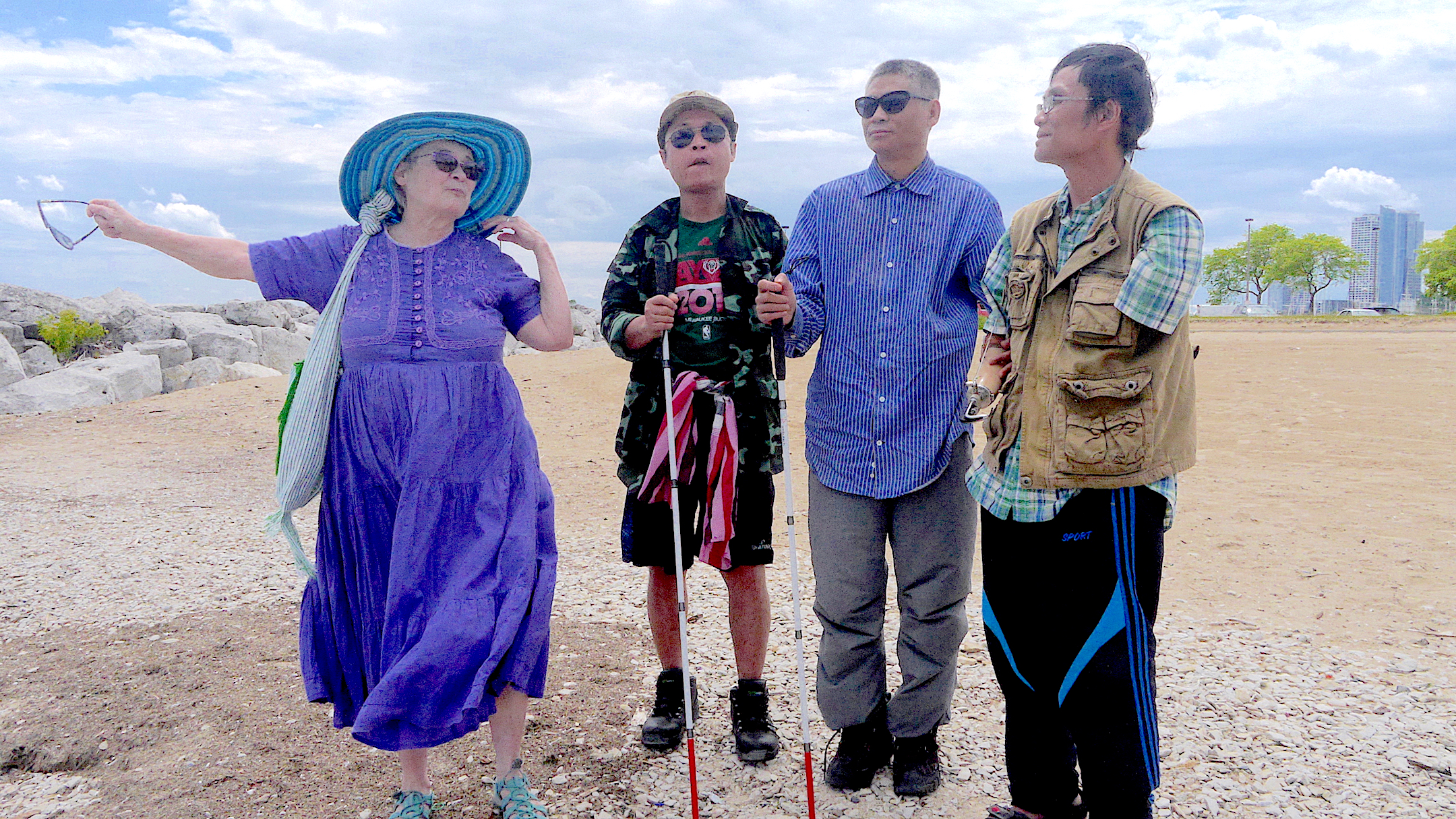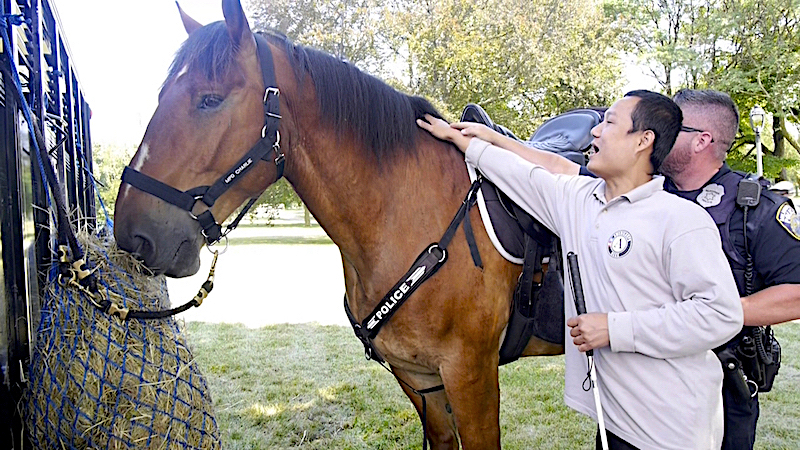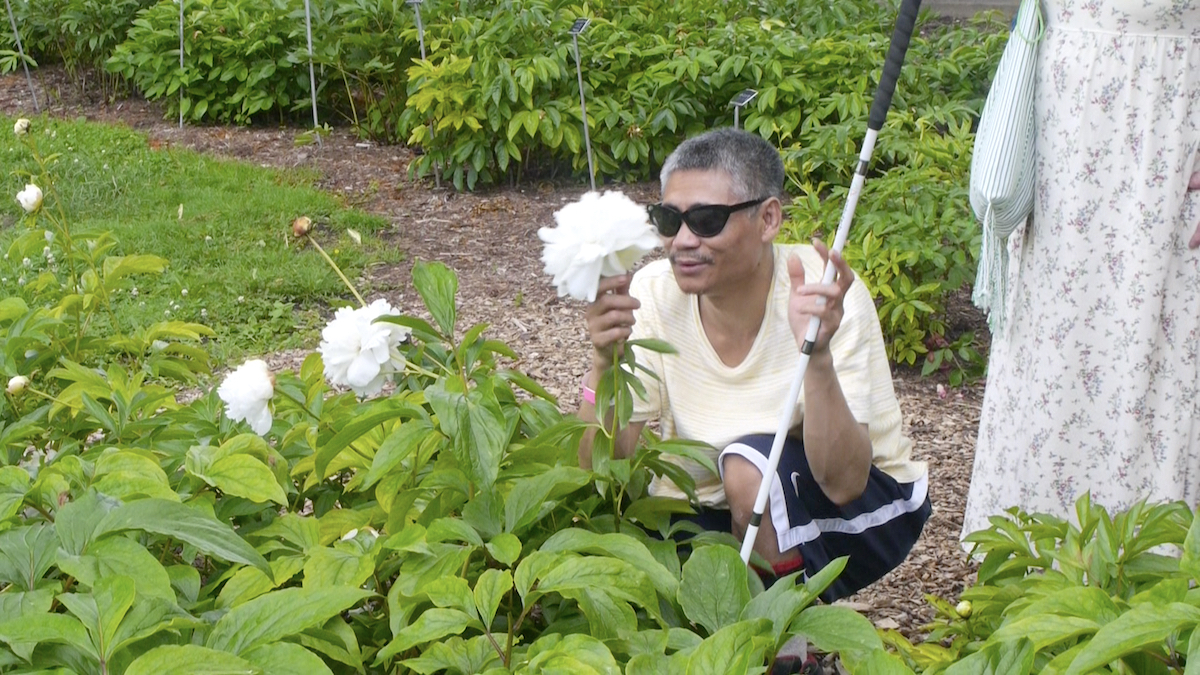
The documentary “Eye Witness” focuses on six blind Karen refugees who are learning English at St. Michael Parish, Milwaukee. The film can be viewed on Vimeo. (Submitted photo)
Learning a new language is difficult enough, but it’s especially difficult for those injured and blinded by land mines in a war-torn country.
A recently released documentary — “Eye Witness” by Lenore Rinder — chronicles some of the work St. Michael Parish is doing with refugees who now consider the faith community their home.
This film focuses on six blind Karen refugees from Myanmar (formerly Burma) who are learning English in an English as a Second Language classroom in the basement of St. Michael Parish, Milwaukee.
Many refugees became blind and lost limbs due to exploding land mines while working in their gardens. The Burmese military placed the mines to drive out or eradicate unwelcome ethnic groups in Myanmar.
In addition to adapting to a new culture and learning English, the men are studying to become American citizens, said Rinder, who holds a master’s degree in fine arts from the University of Wisconsin-Milwaukee in painting and film.
“When I began taping their English lessons, I quickly felt their strong spirit and sense of humor,” she said. “I am an ‘eye witness’ to how these men have fled from the horrors of a long, senseless war, but they flourish with the collective compassion of those around them.”
Rinder took a year and a half to gather footage for the documentary and another three months to edit with her creative advisor, Dick Blau, a Professor Emeritus at UW-M.
“I am hoping to reach audiences interested in seeing how another culture adapts to ours; how a loving, generous community helps each other and for all people who want to be uplifted,” Rinder said. “I hope as many people as possible can see the film. I entered it into a few international film festivals. Ethnografilm in Paris screened it (in April).”
While she was not involved in the filming of “Eye Witness,” Deborah Lindberg, who leads St. Michael and St. Rose’s Literacy Program, works with 10 tutors and 31 students from Lao, Karen, Karenni, Chin, Congolese, Mexican and Puerto Rican backgrounds. She also taught two of the men featured in the documentary.
“The students are learning basic English to intermediate English for daily living, citizenship, family literacy and computer skills,” Lindberg said. “We also help our students to connect with community resources for medical, dental, clothing and food.”
In addition to overseeing the growing literacy program, Lindberg trains tutors, fundraises and does the program’s administrative work, along with teaching 13 of the students. She also ensures the students are connected with services in the community.
Lindberg hopes “Eye Witness” will bring awareness to the lives the refugees are escaping when they come to Milwaukee.
“The film will show people how different people’s lives are in a third-world country, where people’s survival is threatened in many ways. There is never enough food and often people lose hope of having a better life,” Lindberg said. “Those who have come to the U.S., and specifically Milwaukee, have demonstrated a great deal of courage to come to this country with strong faith, hope and resilience to have a better life for themselves and their families. They are grateful for the opportunity to be able to find employment, send their children to school, receive medical and dental care, and have enough food. One thing I often hear is that when they were in the refugee camp, they could not work or buy food. They received one allotment of food per month, and they were always hungry.”
Since Lindberg began coordinating the program in 2017, about 40 immigrants have become U.S. citizens, many own their own homes and have better employment since learning English.
According to Fr. Rafael Rodriguez, pastor of St. Michael and St. Rose parishes, Rinder approached him about doing the documentary before the pandemic and was very sincere about the lives of refugees from Southeast Asia in the United States.
“I was intrigued by her passion for capturing people’s experiences and their interaction with nature. She has traveled extensively in India,” Fr. Rodriguez said. “My hope is this film helps those who watch it realize how close mission territory is for us here in Milwaukee, with locals and newcomers; that there is an opportunity to meet people who deeply love their Catholic faith and strive to integrate into American society through resilient trust in God’s divine providence, hard work, traditional family values and generosity. So, we can all say ‘eye (I) witness’ the Gospel come alive.”
With so many different ethnic groups at St. Michael Parish, it is easy to see why it is the most ethnically diverse congregation in the state of Wisconsin, said Fr. Rodriguez. Since its inception in 1883, St. Michael has served as a place where refugees find a spiritual home.
“Originally founded by German immigrants, the parish received displaced German-speaking persons from Eastern Europe after World War II (the Donauschwaben). In the 1980s, we welcomed Southeast Asian immigrants (both Lao and Hmong), and Latinos from the Caribbean and all Americas,” Fr. Rodriguez said. “African Americans also embraced St. Michael’s as their parish. Since 2011, we have opened our doors to recent immigrants from Myanmar, who have arrived in Milwaukee through a United Nations resettlement program, escaping terrors in their native country.”
Recently, the parish has welcomed refugees from Congo and Tanzania.
Fr. Rodriguez believes this pattern of refugees reaching out to other refugees, now across cultural lines, is truly the work of the Holy Spirit.
“Our experience as immigrants ourselves helps us fulfill the mission of the Catholic Church to ‘welcome the stranger,’” he said. “I truly believe that what brings us together is the celebration of the Holy Eucharist as one family in Christ. Christ’s real presence in the Holy Eucharist helps us to be in real communion with one another.”
To view the film, visit: https://vimeo.com/429423487.


